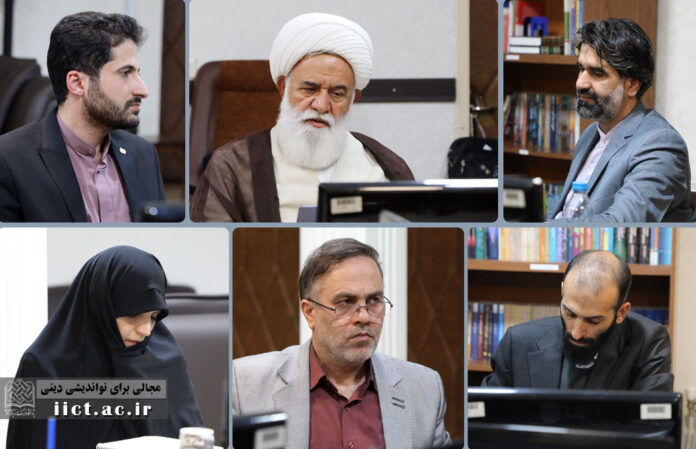According to the Public Relations Office of IICT, and as reported by Dr. Esmaeili, Executive Secretary of the Theoretical-Religious Biotechnology and Genetic Engineering Studies Center at the Institute, on Tuesday, April 22, 2024, a joint meeting was held where Ayatollah Rashad, President and Founder of the Institute, met and discussed with Dr. Mohammad-Hossein Motahari, Head of the Biotechnology Development Headquarters at the Vice Presidency for Science, Technology, and Knowledge-Based Economy.
At the beginning of the meeting, Dr. Mehdi Rahimi, Head of the Growth and Innovation Center, introduced the Institute, its Growth House, and the Theoretical-Religious Biotechnology and Genetic Engineering Studies Center. He also mentioned the Institute’s agreement with Dr. Dehghani, the esteemed Vice President for Science, Technology, and Knowledge-Based Economy, which established the Institute’s responsibility to manage and enhance the existing capacities of the Humanities Innovation Hub.
Dr. Rahimi emphasized the importance of addressing emerging issues and focusing on theoretical and humanities aspects. He added that, based on the agreement between the Scientific Vice Presidency and the Institute, various scientific centers such as the Diplomacy Center, Governance Center, and the Theoretical-Religious Biotechnology and Genetic Engineering Studies Center were established. These centers are actively engaged, and there are plans to expand these activities based on the capacities and resources of the country’s various scientific research centers, including the Biotechnology Development Headquarters.
Ayatollah Rashad, expressing his pleasure at Dr. Motahari’s presence, stressed the importance of addressing biotechnology issues and actively keeping pace with advancements in this field and its various aspects. He stated that biotechnology has become an integral part of people’s lives today, impacting all aspects of human life. Such advancements might threaten religious beliefs and values. For example, when Darwinism or the theory of evolution was introduced, some philosophers, including the late Ayatollah Misbah and others, as well as some experts in life sciences, provided responses. Similarly, many unanswered questions remain regarding biotechnology, which need to be addressed alongside scientific progress.
Ayatollah Ali Akbar Rashad continued by discussing the Institute’s management of scientific production and its accumulated experience in this field. He also referenced the scientific authority of the Institute’s faculty members and the collaboration agreement between the Institute and the Biotechnology Development Headquarters during Dr. Mostafa Ghanei’s supervision. He noted that since the signing of the agreement, significant activities in the field of biotechnology have been carried out. He mentioned that he himself had drafted a comprehensive study plan on biotechnology encompassing philosophical, theological, ethical, jurisprudential, legal, and other aspects. Additionally, for about three to four years, he has been conducting advanced jurisprudence classes on genetic engineering, initially focusing on the philosophical and theological foundations of biotechnology, cloning, and related issues, and currently discussing artificial insemination.
The President and Founder of the Institute further stated that among the other activities of the center is the preparation of a book on the jurisprudence of biotechnology, which I have written in two volumes in Arabic, with a Persian translation currently in progress. Another scientific activity of the Theoretical-Religious Biotechnology Studies Center is the compilation of a conceptual lexicon of biotechnology verses, which can serve as a reference book. This work is currently being completed, and similar work could also be done for the hadith and traditions.
Ayatollah Rashad also emphasized the importance of bringing attention to biotechnology issues within the seminary community. He mentioned that at the Imam Reza (AS) Seminary, a program in the jurisprudence of biotechnology has been designed to make the seminary community aware of these issues and train scholars in various fields of biotechnology, including ethics, jurisprudence, theology, philosophy, and more. He also highlighted the importance of networking and creating a database of researchers in the field of biotechnology to enhance human capacity and make proper use of scientific experts. He stressed the need for an annual national conference in the field of biotechnology.
Dr. Abbaszadeh, Deputy for Research and Education at the Institute, expressed his satisfaction with the meeting and said: “IICT was established with a strong and solid foundation. Although it has been a short time since the establishment of the Theoretical-Religious Biotechnology and Genetic Engineering Studies Center, it has already led to significant achievements. We have been able to conduct major research in this field, including studies on religious culture and the environment, biotechnology and cognitive sciences, Islamic mysticism in the context of environmental ethics, pre-jurisprudence issues of biotechnology, genetic engineering jurisprudence, and biological warfare. We have also published a book on the jurisprudence of biotechnology, compiled a conceptual lexicon of biotechnology verses, held a specialized school and three seminars, issued a call for a national conference on Theoretical-Religious Life Sciences and Biotechnology Studies, and supported doctoral theses and advanced seminary studies. (levels 3 and 4)”
Later, Dr. Mirzapour, Scientific Manager of the Biotechnology Studies Center, emphasized the need for content production in humanistic studies of biotechnology and stated that decision-making in this area must consider scientific appendices. He noted the importance of developing foundational literature in the field of theoretical biotechnology studies, alongside addressing the needs of the Biotechnology Development Headquarters in promotion, education, and research.
Dr. Motaalehi, Head of the Biotechnology Development Headquarters, expressed his pleasure at the joint meeting and the focus on the psychological impacts of biotechnology education and promotion. He said: “Unfortunately, teaching science and technology, apart from the realm of doubts, does not have a beneficial psychological effect and can weaken the beliefs of the audience. Therefore, if the soft appendices are not accounted for, they can have many adverse consequences. History of science shows how individuals with particular intellectual backgrounds entered universities and how promotions and education have led to various outcomes. Thus, attention to the soft appendices in this field is very important, and IICT can be a central scientific hub for the humanistic studies in this area, from which we can benefit.”




